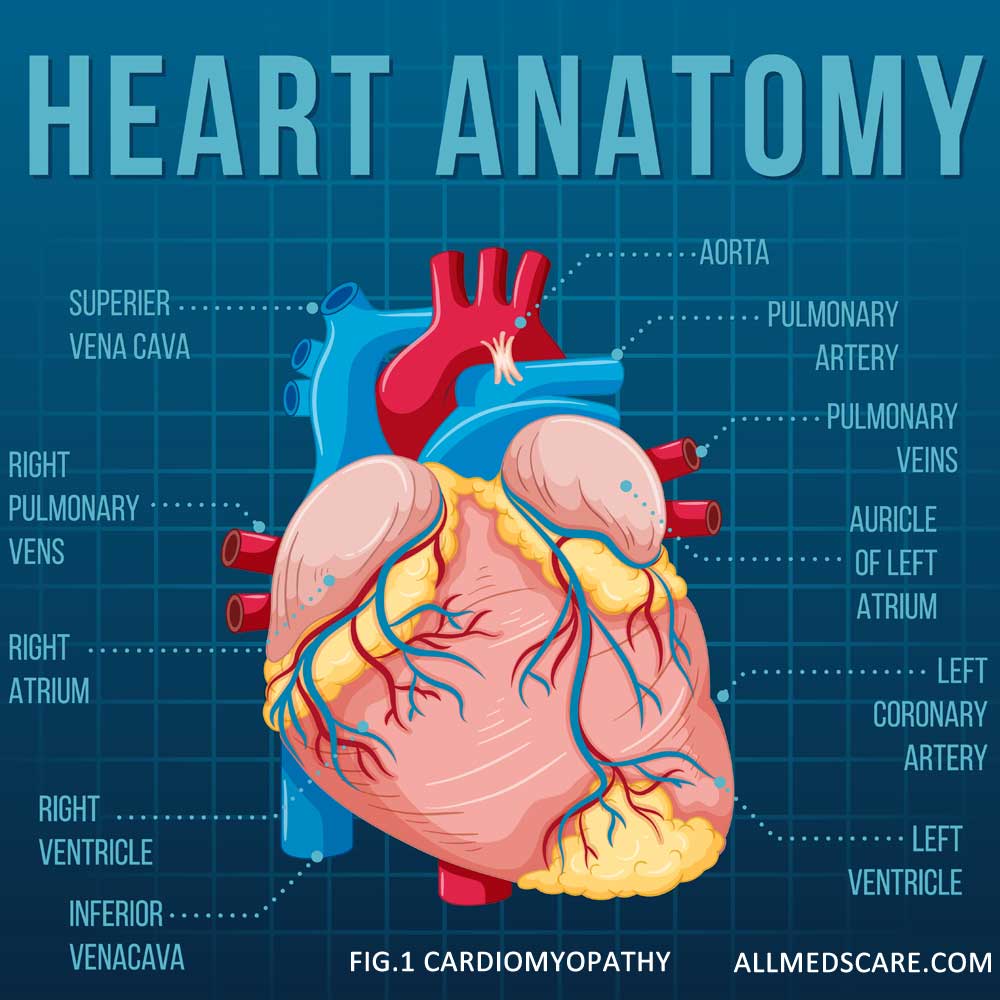
Cardiomyopathy
Cardiomyopathy is a condition that weakens the heart muscle, making it more difficult for the heart to pump blood to the body’s tissues. In addition to weakening the heart muscle, this illness can cause a number of consequences.

It comes in a variety of forms, including:
- Dilated cardiomyopathy (DCM): The heart’s ability to pump blood is compromised by the weakening of the heart muscle and the enlargement of the heart chambers.
- Hypertrophic Cardiomyopathy (HCM): The heart’s ability to pump blood is hampered by the abnormally thickening of the cardiac muscle.
- Restrictive Cardiomyopathy (RCM): The heart muscle stiffens and loses flexibility, which impairs the heart’s capacity to appropriately fill with blood.
- Arrhythmogenic Right Ventricular Dysplasia/Cardiomyopathy (ARVD/C): Fatty or fibrous tissue replaces the muscle tissue in the right ventricle, causing irregular cardiac rhythms.
Symptoms
The symptoms can range in form and intensity depending on the condition, however, they may include:
- Breathing problems, especially after exercising or resting down
- Weakness and weary
- Legs, ankles, feet, or abdomen swelling
- irregular or palpitating heartbeats
- chest discomfort or agony
- fainting or vertigo
Causes of Cardiomyopathy
Cardiomyopathy can have a variety of causes, such as:
- Inherited or genetic traits
- Elevated blood pressure
- Cardiac valve issues
- Overuse of drugs or alcohol
- Viruses that impact the heart
- Uncontrolled diabetes for a long time
- Certain drugs or poisons
- Autoimmune diseases
Risk factors related to Cardiomyopathy
The risk can be impacted by a number of factors, including:
- cardiomyopathy or sudden cardiac death in the family
- possessing particular genetic characteristics
- elevated blood pressure
- Obesity
- Diabetes
- chronic usage of alcohol or other drugs
- Age (different age groups have higher rates of particular forms of cardiomyopathy)
When to seek care:
If you have risk factors for cardiomyopathy or encounter any symptoms of the condition, it’s critical to visit a doctor. Early detection and treatment can aid in managing the condition and avoiding consequences.
Diagnosis of Cardiomyopathy
A doctor may run a number of tests to identify cardiomyopathy, such as:
- Physical examination and assessment of medical records
- ECG, an electrocardiogram, measures the electrical activity of the heart
- To see the structure and operation of the heart, use an echocardiogram.
- MRI or CT scan of the heart to get precise pictures of it
- to assess heart function and look for underlying reasons, blood testing
Treatment
Depending on the nature and severity of the ailment, treatment options may include:
- drugs to treat symptoms, regulate blood pressure, or stop blood clots
- Implantable devices to control heart rhythms, such as pacemakers or defibrillators
- Cardiovascular rehabilitation and dietary and lifestyle adjustments, such as stress reduction and heart-healthy exercise
- surgery for the replacement of a heart valve, a heart transplant, or the installation of a left ventricular assist device (LVAD)
Prevention
Even while some types of cardiomyopathy cannot be prevented, several lifestyle decisions can lower the risk of contracting the disease or slow its progression:
- Being healthy in terms of weight
- Managing chronic illnesses, such as diabetes or high blood pressure
- Limiting excessive alcohol or drug consumption
- Consuming a heart-healthy diet free of salt and saturated fats
- Regular physical activity under the direction of a healthcare professional
Outlook related to Cardiomyopathy
Depending on the kind, severity, and course of treatment, a person with cardiomyopathy may have a different outlook. Many persons with the issue can live happy lives with the right management and lifestyle changes. However, the illness sometimes progresses to heart failure or other consequences, necessitating constant medical attention.
A heart disorder known as cardiomyopathy affects how well the heart muscle pumps blood. Its kinds, causes, and symptoms vary. For the illness to be managed and outcomes to be improved, it is essential to seek medical attention, have an accurate diagnosis, and adhere to a suitable treatment plan. Additionally, lifestyle modifications and preventative measures can significantly lower the risk of cardiomyopathy or reduce the disease’s progression.






